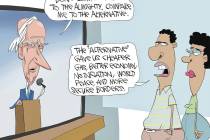EDITORIAL: Sales tax deduction should be permanent
If you’re counting on some level of certainty for your 2014 federal tax bill, it’s not the most wonderful time of year. As in years past, dozens of “temporary” provisions are due to expire Dec. 31.
Of course, many of these breaks aren’t temporary at all. Some of them date back to the 1980s.
The Review-Journal’s Steve Tetreault reported Tuesday that several breaks are particularly popular in Nevada, including a tax waiver for those who obtained principal reductions on troubled mortgages or completed short sales of their homes, and a deduction that allows teachers to write off out-of-pocket expenses for school supplies.
The most noteworthy expiring provision for Nevadans, once again, is the sales tax deduction. Nevada is one of nine states that do not have an income tax, instead funding government largely through sales taxes. It’s a mostly voluntary system that taxes people on what they consume — and puts more money in their pockets to spend on goods and services — instead of penalizing them for being gainfully employed.
After being repealed in 1986, the sales tax deduction was reinstated in 2004, but with a significant change: Instead of allowing Americans to deduct both their state income and sales taxes, as they could through 1986, Congress forced Americans to choose one levy or the other. That deduction has been reauthorized every other year since, allowed to die before being resurrected and extended. A year ago, legislation that kept the country from plunging off the “fiscal cliff” extended the sales tax break through 2013. So Nevadans can claim it on returns filed this spring.
Congress could come together at any point over the next year and again pass a retroactive extension. But for now, lawmakers seem disinclined to do so, which means that when Nevadans sit down in the spring of 2015 to file their 2014 return, they could be hit with a tax hike.
Mr. Tetreault noted that in 2011, 23 percent of this state’s filers claimed the deduction, taking an average break of $342. In this economy, with so many people still feeling the pinch of the downturn, that’s a fair amount of cash. Yet Congress is prepared to raise taxes on some Americans but not others. Residents of states with income taxes would retain that deduction.
That would be grossly unfair, because residents of states that have no income tax suddenly would bear a disproportionate share of the federal tax burden. They would effectively subsidize filers in states that have income taxes — in many cases, such as California and New York, high income taxes.
Congress needs to end this patchwork of temporary extensions. Reform and simplify the Byzantine federal income tax code. Having certainty on tax rates is of less benefit to the economy if deductions die and are reborn year after year. Eliminating the sales tax deduction would be little more than political punishment for states that have avoided adopting a more hostile tax climate. Congress should make the sales tax deduction permanent.
However, if those on Capitol Hill instead choose to end the sales tax deduction, then out of fairness, they must end the deduction for state income taxes as well.























